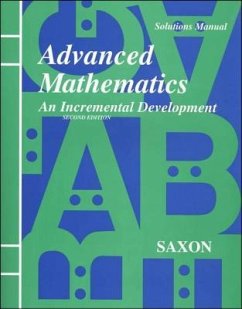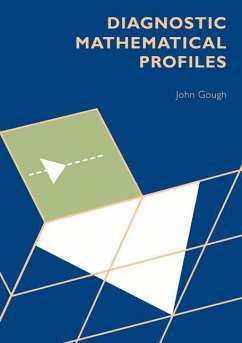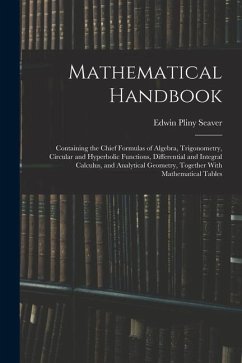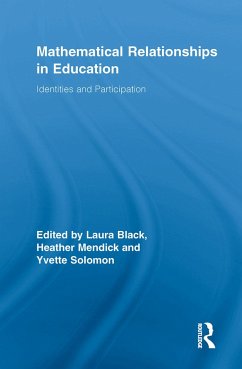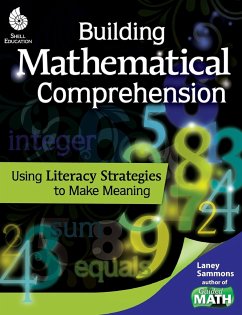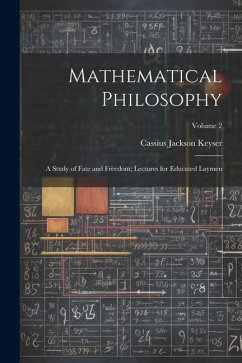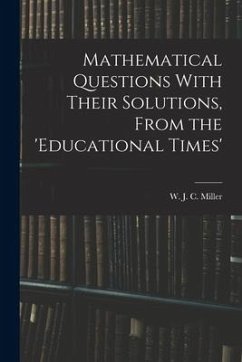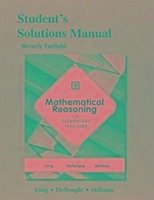
Student Solutions Manual for Mathematical Reasoning for Elementary Teachers
Versandkostenfrei!
Versandfertig in über 4 Wochen

PAYBACK Punkte
43 °P sammeln!




This manual contains completely worked-out solutions for all the odd-numbered exercises in the text.
Calvin Long received his B.S. in Mathematics from the University of Idaho. Following M.S. and Ph.D. degrees in Mathematics from the University of Oregon, he worked briefly as an analyst for the National Security Agency and then joined the faculty at Washington State University. His teaching ran the gamut from elementary algebra through graduate courses and included frequently teaching the content courses for prospective elementary school teachers. His other professional activities include serving on numerous committees of the National Council of Teachers of Mathematics and the Mathematical Association of America, and holding various leadership positions in those organizations. Professor Long has also been heavily engaged in directing and instructing in-service workshops and institutes for teachers at all levels, has given more than 100 presentations at national and regional meetings of NCTM and its affiliated groups, and has presented invited lectures on mathematics education abroad. Professor Long has co-authored two books and is the sole author of a text in number theory. In addition, he has authored over 90 articles on mathematics and mathematics education, and also served as a frequent reviewer for mathematics journals, including The Arithmetic Teacher and The Mathematics Teacher. In 1986, he received the Faculty Excellence Award in Teaching from Washington State University and, in 1991, he received a Certificate for Meritorious Service to the Mathematical Association of America. Aside from his professional activities, Cal enjoys listening to, singing, and directing classical music, reading, fly fishing, camping, and backpacking. Duane DeTemple received his B.S. with majors in Applied Science and Mathematics from Portland State College. Following his Ph.D. in Mathematics from Stanford University, he was a faculty member at Washington State University, where he is now a Professor Emeritus of Mathematics. He has been extensively involved with teacher preparation and professional development at both the elementary and secondary levels. Professor DeTemple has been a frequent consultant to projects sponsored by the Washington State Office of the Superintendent of Public Instruction, the Higher Education Coordinating Board, and other boards and agencies. Dr. DeTemple has co-authored four other books and over 100 articles on mathematics or mathematics materials for the classroom. He is a member of the Washington State University President's Teaching Academy, and in 2007 was the recipient of the WSU Sahlin Faculty Excellence Award for Instruction and the Distinguished Teaching Award of the Pacific Northwest Section of the Mathematical Association of America. In addition to teaching and research mathematics, Duane enjoys reading, listening to, and playing music, hiking, biking, canoeing, traveling, and playing tennis. Richard Millman received a B.S. from the Massachusetts Institute of Technology and a Ph.D. from Cornell University in Mathematics. He is a professor of mathematics and was director of the Center for Education Integrating Science, Mathematics, and Computing (CEISMC) at the Georgia Institute of Technology, which supports STEM outreach in K-12. He was formerly the Outreach Professor of Mathematics at the University of Kentucky, where he was involved in both preservice and in-service teacher training for mathematics teachers. Dr. Millman has co-authored four books in mathematics, co-edited three others, and received ten peer-reviewed grants. He has published over 50 articles about mathematics or mathematics education and has taught a wide variety of mathematics and mathematics education courses throughout the undergraduate and graduate curriculum, including those for preservice teachers. He received, with a former student, an Excel Prize for Expository Writing for an article in The Mathematics Teacher and was a Member-at-Large of the Council of the American Mathematical Society. He was principal investigator and project director for ALGEBRA CUBED, a grant from the National Science Foundation to improve algebra education in rural Kentucky. He was the principal investigator of a Race to the Top grant from the Georgia Department of Education and another NSF grant, SLIDER, in which students use a curriculum based on engineering design in the context of building robots to learn eighth-grade physical science and math. Rich enjoys traveling, writing about mathematics, losing golf balls, listening to music, and going to plays and movies. He also loves and is enormously proud of his grandchildren, with whom he enjoys discussing the conceptual basis of mathematics, among other topics.
Produktdetails
- Verlag: Pearson Education
- 7th Revised edition
- Seitenzahl: 168
- Erscheinungstermin: 7. März 2014
- Englisch
- Abmessung: 274mm x 212mm x 10mm
- Gewicht: 376g
- ISBN-13: 9780321901026
- ISBN-10: 0321901029
- Artikelnr.: 40336612
Herstellerkennzeichnung
Libri GmbH
Europaallee 1
36244 Bad Hersfeld
gpsr@libri.de
Für dieses Produkt wurde noch keine Bewertung abgegeben. Wir würden uns sehr freuen, wenn du die erste Bewertung schreibst!
Eine Bewertung schreiben
Eine Bewertung schreiben
Andere Kunden interessierten sich für



